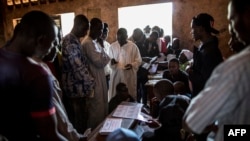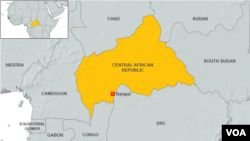The Central African Republic’s electoral commission is scrambling to get everything in place for polling, delayed Thursday by several days because of logistical difficulties. Many hope the national elections, now set for Wednesday, will bring peace to the country after three years of violent conflict.
Five days ahead of elections for a new president and parliament, voter cards have just arrived in this capital city’s neighborhood of Boeing, next to the airport. Electoral workers, seated on wooden benches or cross-legged in the grass, busily sort the cards.
"We are trying to put them in alphabetic order; here, for example, you have the letter T," says André Gamtan, in charge of the polling station. "It takes longer because many of the workers and voters can’t read and write."
Ballots only arrived in the capital on Wednesday, too late for the U.N. peacekeeping mission known as MINUSCA to deliver them to the provinces.
Prospects for improvement
Already long delayed, the elections potentially will help the country turn a page in the three-year conflict that erupted after rebels ousted President Francois Bozize in 2013, Central Africans and international organizations hope.
Elections organized in haste, however, will only deepen the country’s problem, says Roland Marchal, an Africa analyst at the Sciences Po Paris School of International Affairs in Paris.
"Except for diplomats, few are convinced the day after the elections will be significantly different than the day before the elections," Marshal says.
The greatest danger is if the elections aren’t seen as credible, he says. A number of people will likely be blocked from voting, simply because authorities did not have time to verify the voters’ lists.
Another concern is that elections will take place before the disarming of Christian and Muslim militias that still control parts of the provinces and some Bangui neighborhoods.
"Potentially, it’s very possible for any armed group to keep its major weapons and be able to strike – if not the day after the elections, certainly six months or one year after, when the attention of the international community will be reduced with the expectations that the elections improved the situation," Marshal says.
‘Nothing is certain’
International organizations have been pushing for the C.A.R. to hold elections before 2015 ends. Western diplomats in Bangui consider the elections necessary to stabilize the country after three years of chaos, overseen by a weak transitional government.
Timing is tight and insecurity remains a concern.
Mourouba Sakanga, who’s with the national electoral authority, says he’s "optimistic. We will try to meet the new date. However," he acknowledges, "nothing is certain."
A referendum on a new constitution last week was seen as a key test of whether the country was ready to vote. Almost 2 million out of 4.8 million Central Africans had registered to vote.
Turnout was only 38 percent, but those who voted overwhelming approved the constitution, which cuts the power of the military and limits the president to two five-year terms.





